
The sun bear is a species in the family Ursidae occurring in the tropical forests of Southeast Asia. It is the smallest bear, standing nearly 70 centimetres at the shoulder and weighing 25–65 kilograms. It is stockily built, with large paws, strongly curved claws, small rounded ears and a short snout. The fur is generally jet-black, but can vary from grey to red. Sun bears get their name from the characteristic orange to cream coloured chest patch. Its unique morphology—inward-turned front feet, flattened chest, powerful forelimbs with large claws—suggests adaptations for climbing.

The Wellcome Sanger Institute, previously known as The Sanger Centre and Wellcome Trust Sanger Institute, is a non-profit British genomics and genetics research institute, primarily funded by the Wellcome Trust.
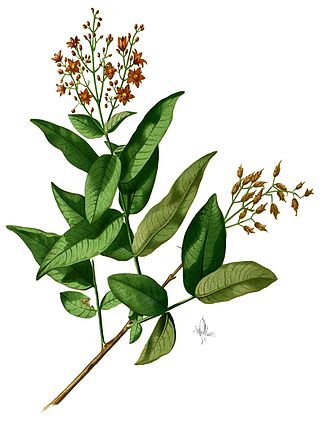
Cratoxylum is a genus of flowering plants in the family Hypericaceae, native to tropical Asia. The generic name is from the Greek meaning "strong wood", referring to the timber.
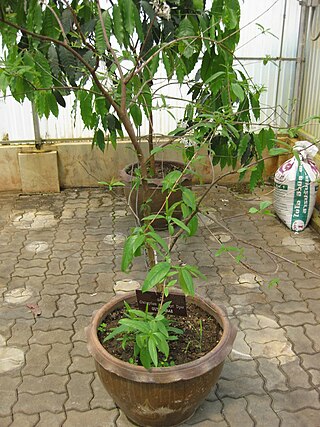
Cratoxylum maingayi is a plant in the family Hypericaceae. It is named for the botanist Alexander Carroll Maingay.
Anisophyllea beccariana is a tree of tropical Asia in the family Anisophylleaceae. It is named for the Italian botanist Odoardo Beccari.
Anisophyllea chartacea is a tree of Borneo in the family Anisophylleaceae. The specific epithet chartacea is from the Latin meaning "papery", referring to the leaves.
Anisophyllea corneri is a tree of tropical Asia in the family Anisophylleaceae. It is named for the English botanist Edred John Henry Corner.
Canarium littorale is a tree found in tropical Asia and is a member of the incense tree family Burseraceae. The specific epithet littorale is from the Latin meaning "of the seashore", referring to its habitat.
Canarium patentinervium is a tree of tropical Asia in the incense tree family Burseraceae. The specific epithet patentinervium is from the Latin meaning "spreading nerves", referring to the leaf veins.
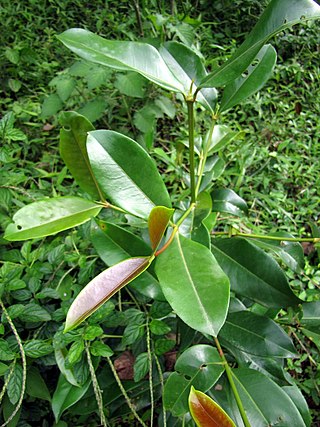
Carallia is a genus of trees in the family Rhizophoraceae.

Euonymus cochinchinensis is a tree of tropical Asia in the staff vine family Celastraceae. The specific epithet cochinchinensis refers to the species being native to Indo-China.
Allantospermum borneense is a tree in the family Irvingiaceae. The specific epithet borneense is from the Latin meaning "of Borneo".
Combretocarpus is a monotypic genus of tree in the Anisophylleaceae family. The generic name combretocarpus is from the Greek, referring to the resemblance of its fruit to that of the genus Combretum. As of April 2014 The Plant List recognises the single species Combretocarpus rotundatus.

Canarium hirsutum is a tree in the family Burseraceae. The specific epithet hirsutum comes from the Latin meaning "bristly", referring to the rough hairs of the fruit.
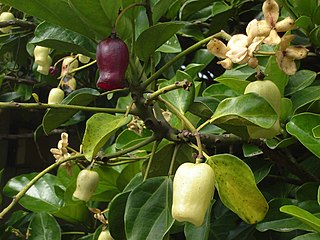
Atuna excelsa subsp. racemosa, synonym Atuna racemosa, is a tree in the family Chrysobalanaceae. The epithet racemosa is from the Latin meaning "clustered", referring to the inflorescence. The tree is widely known as tabon-tabon in the Philippines, where the fruits have been traditionally used for the preparation of kinilaw for almost a thousand years.
Picrasma javanica is a tree in the family Simaroubaceae. The specific epithet javanica is from the Latin meaning "of Java".
Carallia borneensis is a tree of tropical Asia in the family Rhizophoraceae. The specific epithet borneensis is from the Latin, referring to the species being native to Borneo.
Carallia coriifolia is a tree of Borneo in the family Rhizophoraceae. The specific epithet coriifolia is from the Latin meaning "leathery leaf".
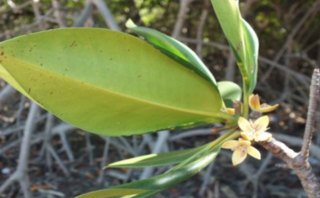
Ceriops decandra is a mangrove plant of tropical Asia in the family Rhizophoraceae. The specific epithet decandra is from the Greek meaning "ten male", referring to the flower having ten stamens.
Gynotroches is a monotypic genus of trees in the family Rhizophoraceae. It contains the single species Gynotroches axillaris. The generic name Gynotroches is from the Greek meaning "woman wheel", referring to the shape of the stigma. The specific epithet axillaris is from the Latin, referring to the axillary position of the flowers.








